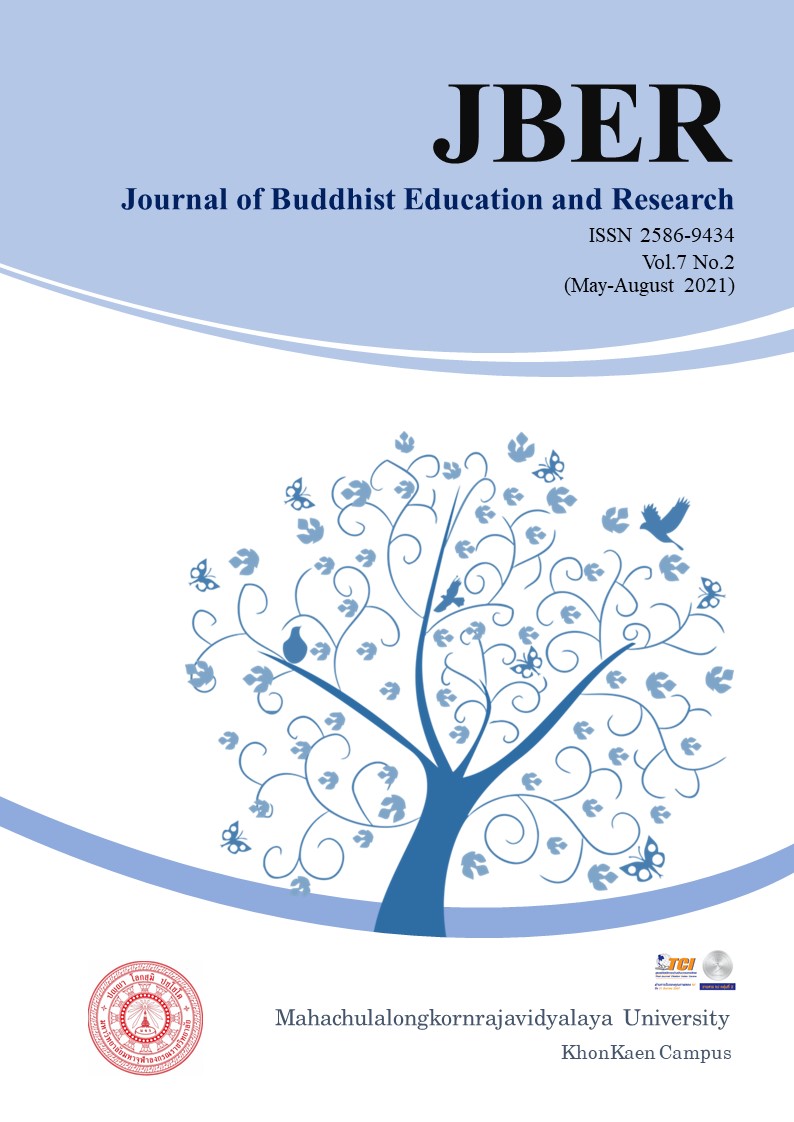INTEGRATION STEM EDUCATION FOR STUDENTS' COMPETENCIES IN THE 21st
Keywords:
The Engineering Design Process (EDP) , 21st Century Competencies.Abstract
The STEM education was process within classroom by planning. The learners could explore, initiate social contexts, challenge and generate student. The authors had to present a guideline to design a learning management process for integrating STEM knowledge using a 6-step engineering design process, including (1) Identify the problem (2) Analyzing five capitals (3) Exploring information (4) Planning and developing knowledge to sharing (5) Model solution testing and evaluating the solution (6) Presentation of results, reflection and revise present the solution. The design was processes to application of science and mathematics knowledge to other science related to problem-solving, which will guide the integration of knowledge for students to use in the future.
References
ชวนิดา สุวานิช. (2017). STEM Education กับการจัดการเรียนรู้เพื่อพัฒนานักศึกษา วิชาชีพครูให้มีคุณลักษณะ ของผู้เรียนในศตวรรษที่ 21 ภายใต้นโยบายประเทศไทย 4.0. วารสารศึกษาศาสตร์ มหาวิทยาลัยศิลปากร.15(1), 18-27.
อภิสิทธิ์ ธงไชย. (2016). ความสำคัญของวิศวกรรมในการจัดการเรียนรู้วิทยาศาสตร์ในศตวรรษ ที่ 21. วารสาร ศึกษาศาสตร์ปริทัศน์. 31(3), 48-53.
Asghar, A. , Ellington, R. , Rice, E. , Johnson, F. , & Prime, G. M. (2012). Supporting STEM Education in Secondary Science Contexts. Interdisciplinary Journal of Problem-Based Learning, 6(2).
Bootchan B., Tupsai J., Yuenyong C. (2016). Developing the STS Unit of Heat Transfer to Provide Students’ Perception of the Relationship between Science Technology Engineering and Mathematics. Khon Kaen University, Thailand Proceeding of the 3rd International Conference on Language, Humanities and Innovation 2016.
Bybee, R. W. (2010). What is STEM education?. Science, 329(5995), 996-996.
Bybee, R. W., & Fuchs, B. (2006). Preparing the 21st century workforce: A new reform in science and technology education. Journal of Research in Science Teaching. 43(4), 349-352.
Koehler, C., Binns, I. C., & Bloom, M. A. (2015). The emergence of STEM.STEM road map: A framework for integrated STEM education, 13-22.
Corlu, M. S., Capraro, R. M., & Capraro, M. M. (2014). Introducing STEM education: implications for educating our teachers for the age of innovation. Egitim ve Bilim, 39(171).
Carr, R. L., Bennett, L. D., & Strobel, J. (2012). Engineering in the K‐12 STEM Standards of the 50 US States: An Analysis of Presence and Extent. Journal of Engineering Education. 101(3), 539-564.
Ejiwale, J. A. (2012). Facilitating teaching and learning across STEM fields. Journal of STEM Education: Innovations and Research, 13(3), 87
Hellinger, P. & Lee, M. (2011). A decade of education reform in Thailand: broken promise or impossible dream. Cambridge Journal of Education Aquatic Insects. 41(2), 139–158
Institute for the Promotion of Teaching Science and Technology. (2008). National science curriculum standards: The basic education curriculum B.E.2544. Retrieved 2013, from kroo.ipst.ac.th/ipst/eng/curriculum/Science Curriculum.
Trilling, B., & Fadel, C. (2009). 21st century skills: Learning for life in our times. John Wiley & Sons.
Tupsai, J., Bunprom, S., Saysang, J., & Yuenyong, C. (2019). Students’ Applying STEM Knowledge in Learning on the STS-STEM Education Wave Learning Unit. Journal of Physics: Conference Series. 1340(1), 012054. IOP Publishing.
Tupsai, J., & Yuenyong, C. (2018, January). Investigating students’ view on STEM in learning about electrical current through STS approach. AIP Conference Proceedings. 1923(1), 030054). AIP Publishing LLC.
Seattha, P., Tupsai, J., Sranamkham, T., & Yuenyong, C. (2016). Students’ view on STEM in learning about circular motion through STS approach. AIP Conference Proceedings. 1775(1), (030063). AIP Publishing LLC.
Srikoom, W., Hanuscin, D. L., & Faikhamta, C. (2017). Perceptions of in-service teachers toward teaching STEM in Thailand. Asia - Pacific Forum on Science Learning and Teaching, 18(2), 1-23. Retrieved from https://search.proquest.com/scholarly-journals/perceptions-service-teachers-toward-teaching-stem/docview/2055193566/se-2?accounted=27797
Wongwanich, S., &Wiratchai, N. (2004). Evaluation of the Learning Reform In Accordance With the National Education Act 1999: Multiple Case Studies. Paper for an academic meeting on research on learning reform, organised by the Office of the Education Council, Ministry of Education, July 19-20, 2004, 243-252.





